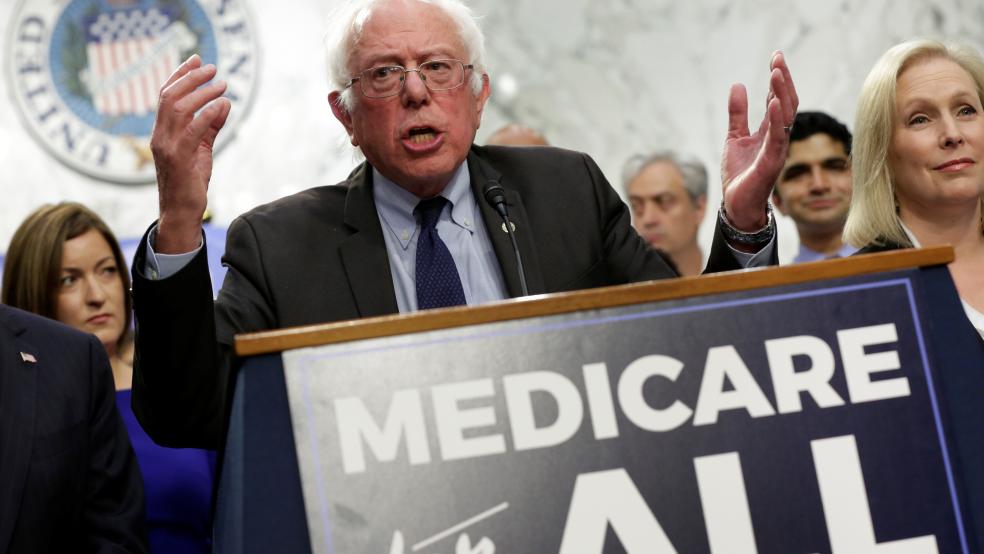Sen. Bernie Sanders’ “Medicare for all” proposal would increase federal spending by $32.6 trillion over 10 years, according to a new analysis of the proposed legislation by a libertarian think tank.
The analysis by Charles Blahous of the Mercatus Center at George Mason University says that federal spending under a universal, single-payer system would equal roughly 10.7 percent of GDP in 2022, rising to 12.7 percent by 2031.
“Enacting something like ‘Medicare for all’ would be a transformative change in the size of the federal government,” Blahous, who served as a senior economic adviser to President George W. Bush, said in a statement.
Paying for such a system would require a historic increase in taxes — and Blahous writes that “doubling of all currently projected federal individual and corporate income tax collections would be insufficient to finance the added federal costs of the plan.”
The findings are roughly in line with other efforts to estimate the costs of a universal health care system similar to Medicare. In 2016, the Urban Institute calculated that Bernie Sanders’ proposed single-payer system would increase federal expenditures by $32 trillion over 10 years, 2017 to 2026.
Conservative critics were quick to highlight the new report’s eye-popping cost estimates. Fox News raised the alarms, warning that the “Democrats ‘Medicare for all’ socialist scheme would run up a staggering tab for all taxpayers.” House Speaker Paul Ryan tweeted, “$32.6 trillion dollars. That’s how much Washington Democrats’ single-payer healthcare proposal would cost over 10 years. Even doubling all federal individual and corporate income taxes wouldn’t cover this cost. It is just absurd.”
But others pointed out that the increase in federal spending outlined in the report represents a shift in spending from the private to the public sector – and that overall health spending under the Medicare for all plan is actually a bit lower than the current baseline.
In other words, according to the analysis, Bernie Sanders’ health care plan would cost the country about the same in aggregate as the current system, while covering the entire population.
Larry Levitt of the Kaiser Family Foundation tweeted, “This Mercatus analysis illustrates both the promise and pitfall of Medicare for all. Universal coverage with no patient cost-sharing for less health spending overall than the status quo. But, $32.6 trillion in higher federal spending and taxes over 10 years, which sounds scary.”
Some analysts and supporters of the effort to create a single-payer health care system touted the Blahous report as proof that universal health care makes economic sense:
- “When you consider a universal single-payer program would 1) cover every single American, eliminating uninsurance and 2) provide much more robust benefits, covering more services than get covered right now, then it starts to look like a good deal.” – Dylan Scott, Vox
- “I would never have expected the Mercatus Center to produce a document that claims extending Medicare to the entire population is the proverbial $20 bill lying on the sidewalk. There is such a thing as a free lunch, per Mercatus.” – Marshall Steinbaum, Roosevelt Institute
- “The US could insure 30 million more Americans and virtually eliminate out-of-pocket health care expenses while saving $2 trillion in the process, according to a new report about Medicare for All released by the libertarian Mercatus Center.” – Matt Bruenig, Jacobin
Nevertheless, there are still plenty of questions about the Sanders plan’s economic – and, in particular, political – feasibility, not least with respect to the assumptions about system-wide savings resulting from such a plan.
In calculating his cost estimate, Blahous assumed that the new universal system would succeed in “dramatically reducing payments to health providers, in addition to substantially reducing drug prices and administrative costs.” For example, the Sanders plan would apply Medicare’s lower payments for medical services to the entire health care system – an effort that would no doubt meet considerable resistance from the health care industry.
Yevgeniy Feyman of the conservative Manhattan Institute told Vox that those assumptions are very much in question: “Lower spending is driven by lower provider payment rates, drug savings, and administrative cost savings. It’s not clear to what extent those savings are politically feasible, and socially beneficial.”
Despite what some supporters of universal health care saw as a surprisingly positive report from a conservative source – a think tank that has received millions of dollars in funding from the libertarian Koch brothers – Sanders attacked what he said was bias in the study: “If every major country on earth can guarantee health care to all, and achieve better health outcomes, while spending substantially less per capita than we do, it is absurd for anyone to suggest that the United States cannot do the same. This grossly misleading and biased report is the Koch brothers response to the growing support in our country for a ‘Medicare for all’ program."




